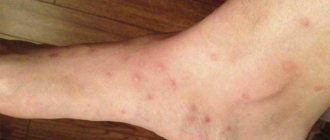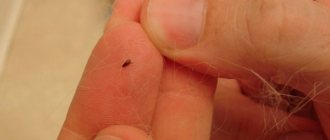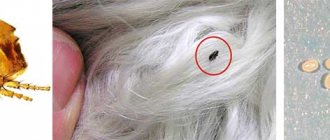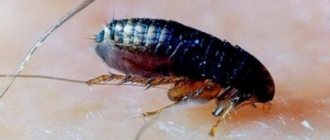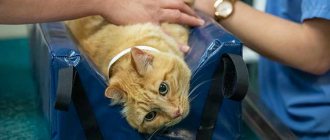Do fleas bite humans?
Fleas are warm-blooded creatures with an elongated jaw and piercing-sucking mouthparts. They feed exclusively on blood, taking into account the anatomical structure of the body and the structure of the body.
Humans are a potential source of food for parasites, because their skin, unlike many animals, is thin and delicate. However, bloodsuckers do not live long on the human body. They need protection: thick fur, which is found on dogs, cats, and birds. This is where they most often settle.
Note! First of all, parasites attack animals. This is their main owner. If there is not enough blood, then in search of a new source of food they migrate to people.
Methods for getting rid of cat fleas in the house
Treating flea bites alone is not enough: it is important to destroy the parasite or force it to leave the house in order to avoid a recurrence of the problem. To do this, it is necessary to treat all pets with special anti-flea products in the form of drops, spray, shampoo, etc. It is also advisable to put flea collars on all animals, which will prevent the possibility of the parasite getting on the fur of pets.
Bathing a cat with a special shampoo will help rid the animal of fleas
After your pets have been “treated,” you can begin treating your home for fleas. For this purpose, special preparations are usually used that are diluted in water. After which a thorough wet cleaning of all premises is carried out. It is necessary to treat all upholstered furniture, carpets, pet's sleeping place, even cracks in the floor.
After treating your home with chemicals, it is not recommended to carry out routine cleaning for 4-5 days. During this period of time, all fleas will probably disappear from your home.
Keep in mind that all of the above actions are carried out only if the flea bite was not isolated or accidental (for example, received in nature). Monitor the health of your pets and be careful. Good luck!
Why do some people get bitten and others not?
The animal's skin is thick. It is difficult to bite through, especially if the body is thick with fur. Humans (especially children) have soft, thin skin. Fleas are also attracted to the natural human scent. They can bite exposed areas of the body, but only if they are not covered with perfume. Strong odors are repulsive and the insect is unlikely to bite.
Dog parasites prefer human body odor. They can bite if the skin is thin and the blood vessels are close to the surface. More often, men catch bites on themselves, because fleas are easily contained in thick hair. Women who have their legs waxed are less likely to be attacked by parasites.
This is interesting! There is an opinion that parasites bite people whose blood type is first, as the most nutritious and tasty. This is partly true. This kind of blood is common and really tasty. Although scientists do not confirm this fact. It is also a myth that dog fleas are picky. They can bite one person in the house and ignore others. Parasites don't care who they attack. Rather, some people simply do not notice a flea bite, while others, on the contrary, react painfully.
Why don't cat fleas bite all people?
When there is no cat nearby, parasites are forced to look for another source of food. But it has been noticed that some people are bitten by fleas, while others are not – why this happens, one can only speculate.
The first version is based on the fact that the choice of victim is carried out by blood type. If this were so, only the owners of the first group would suffer - in terms of taste, it is most suitable for blood-sucking insects.
However, in practice the theory is not confirmed. People with the second, third and fourth groups are bitten, and no dependence on rhesus has been established either.
You can often hear the question: why fleas do not bite everyone, but only me. Choose the most suitable option:
- You have thin, delicate skin, thanks to which the ectoparasite’s proboscis easily reaches small vessels. If an insect cannot get to the blood, it will not bother a person.
- You have a cold and fever. Heat attracts fleas; they will choose as a victim the one with a higher body temperature.
- After physical activity, you experience increased sweating. The smell attracts bloodsuckers, but once you take a shower, they will prefer another family member (they will look for someone from the first two categories).
Regardless of the reasons why fleas bite one person and not another, the consequences vary. Some people develop blisters that itch unbearably, while others experience allergic reactions. It happens that over time, sensitivity is lost, and insects stop bothering you.
How to distinguish flea bites from other insects?
Flea, bedbug, and mosquito bites are similar. But the first one has its own characteristics:
- Leaving a track of 11-12 cm from 2-3 punctures.
- The appearance of swelling with a dot in the center.
- Damage to feet, legs, hands. Bedbugs, for example, can leave marks on any part of the body.
- The ability to bite at any time, bedbugs bite only at night.
- The appearance of severe, but quickly passing (1-24 hours) itching.
Additional Information! Crushed bedbugs leave brown stains on mattresses and sheets. Fleas are almost invisible. Even severe pain during a bite does not appear for long. Not every person can feel a flea bite unless they have delicate, hypersensitive skin. Unlike other insects, fleas practically do not secrete an anesthetic element when they bite due to the dense chitinous cover and flat body of the body. They simply stick to a person and begin to suck blood, lowering their proboscis into the skin, pressing in in an attempt to reach a blood vessel.
Consequences of bites
When fleas bite people, they experience severe pain. The consequences for humans can be different, it all depends on the toxicity of the enzymes entering the skin.
After being bitten by sand fleas and other types of fleas, bleeding may occur under the dermis. As a result, hemorrhage occurs. If there is a significant concentration of bites on one area of the body, purpura will occur.
In case of serious consequences, you should consult a doctor
For people, skin lesions can result in:
- serious, difficult to diagnose disease;
- allergy to an enzyme, which can affect blood clotting and in some cases cause swelling or anaphylactic shock;
- an infection caused by scratching a bite.
A person develops an allergy if he previously had a predisposition to it. Children under 12 years of age are most susceptible to it. Infections pose a greater threat.
How are parasites transmitted?
Fleas live everywhere. They are brought into living quarters by cats, dogs, and birds. They choose specific animals, although they easily change their owners if necessary.
Fleas that are on the body of animals also bite people, as they jump well in height: 50-60 cm. Fleas do not fly, but they infect people by jumping long distances. Able to survive in any extreme conditions. Due to the morphological structure of the body, it is not easy to see and crush them.
Flea bites: what they look like and why they are dangerous, read more in the article here.
Fleas:
- canines are transmitted from pet carriers;
- felines are brought in by cats and scatter around the room like fine dandruff;
- rats appear from rats living in garbage dumps and sewers.
Rat fleas are the most dangerous insects, carriers of infectious diseases (salmonellosis, cholera). They move between apartments, roam from one door to another or from house to house.
Treatment options
If your feet itch unbearably, the first thing you should do is not scratch the bite sites, but resort to pharmaceutical or folk remedies. You can perform the procedures yourself only if there is no allergic reaction.
Special ointments and creams for treating bites
Special pharmaceutical preparations, which are produced in the form of ointments and creams, will help get rid of itching:
- “Fenistil-gel”. Helps relieve itching and irritation. The gel quickly penetrates the skin due to its light texture. Relieves swelling and pain, has a cooling effect.
- “Kalamine.” It comes in the form of a solution that needs to be applied to a cotton swab and spread on the places where there are bite marks. “Calamine” dries and soothes irritated areas of the epidermis.
- “Psilo-balm.” Able to cope with severe itching. Has calming and antiallergic properties.
- Hydrocortisone ointment. If you treat the skin immediately after a bite, the ointment helps stop the allergic reaction. Fights inflammation and relieves swelling.
- Balm “Rescuer”. It is recommended to smear the drug on the combed areas, as Rescuer has healing and disinfecting properties.
- Balm “Star”. Refers to inexpensive but effective means. Easily copes with unpleasant sensations after insect bites.
Special ointments for treating bites.
Folk remedies
If you don’t have pharmaceutical ointments at hand, then traditional methods will help:
- Healing herbs. A tincture of dried chamomile flowers, string leaves, calendula, lavender, and parsley root will help relieve swelling, redness and itching. 2 tbsp. Pour a glass of boiling water over dry plants and let it brew.
- Aloe vera. Aloe juice can protect the bite site from inflammation. Squeeze a few drops of juice from the plant and apply to the affected areas.
- If your hands or feet are very itchy because they have been bitten by fleas, lemon juice diluted with water 1:2 will help.
- Baking soda, ammonia. A solution of soda or ammonia is used to combat pain and itching. 1 tsp Dilute soda or ammonia in a glass of water and apply compresses to the bitten person several times a day.
- Tea brewing. Green or black tea will help get rid of itchy skin. You can use it in the form of a lotion or lubricate the affected areas with a freshly brewed tea bag.
How to treat severe consequences of flea bites
Sometimes bloodsucking bites are fraught with more serious consequences than just itching and redness. Sensitive people experience hyperemia, pain and allergic rashes throughout the body. In this case, the doctor prescribes treatment. Complex therapy includes the use of antihistamines, anti-inflammatory, sedatives, antipyretics, analgesics, and sometimes antibacterial drugs.
What types of insects are dangerous to humans?
Over 1000 species of fleas are biting. They are dangerous to people. If earthen parasites are harmless and feed exclusively on the blood of animals, then cat, rabbit, and dog species can parasitize the human body and infect with infections transmitted through blood.
It is not the flea bite itself that is dangerous, but scratching the affected area. In the event of an infection, inflammation will begin to develop with all the ensuing consequences. When some types of fleas bite, they inject an enzyme under the skin that clots the blood.
Doggystyle
The habitat of dog fleas is dog fur and soft bedding. Blood-sucking creatures do not live on the human body, although in times of hunger they will not refuse to drink his blood.
Dog fleas also bite people, settle in human hair, and can fall out of it. When bad conditions occur, they hibernate and live without food for several months. As soon as conditions become acceptable, the parasites come to life and begin to jump on animals and feed on their blood. There is nothing stopping them from changing their owner and transmitting the infection from a sick animal to humans.
Felines
Cat fleas rarely bite people, but they can attach themselves to the body, spread infection, and cause:
- allergies;
- redness;
- intense itching.
If a person begins to scratch the bite site, then if hygiene is not observed, there is a risk of infection and provoking suppuration. Parasites are carriers of diseases: encephalitis, helminthiases, brucellosis, anthrax, plague. A person can catch it after hunting, walking in the forest, or working on a farm. The victims are hunters who look into nests and hollows and do not disdain to eat raw food.
Reference! Cat fleas will welcome any blood donor. They are causative agents of diseases 3 times more often than canine ones. Such parasites lay eggs and black excrement on the skin and fur of cats. They can get into carpets, rugs, upholstery, and floor crevices.
Rat
Rat fleas parasitize rats, although they cannot live long and permanently on the host's body. Jumping fleas enter apartments from basements, from the street on clothes and shoes, through cracks in the floor of the entrance, from neighbors. The dogs bring them in after a walk.
Advice! Typically, bitten pets begin to itch, get nervous, sleep restlessly, and refuse to eat. If fleas have settled on the fur, then upon examination you can see waste products and bite points.
In humans, the site of a rat bite swells, the lymph nodes become enlarged, and the temperature rises. These parasites cause difficulty breathing, headaches, nervous system disorders, allergies, and Quincke's edema. Rats are carriers of infections:
- tularemia;
- plague;
- anthrax;
- salmonellosis;
- encephalitis;
- hepatitis;
- brucellosis.
Important! If a flea bite infects a person with worm eggs, then you should immediately consult a doctor.
Rabbit
Rabbits' fur is thick and ideal for parasitic blood-sucking creatures. Usually bitten pets are anxious and itchy. Fleas lay eggs in the hair of rabbits, which in turn can transmit the infection to humans.
If an insect bites a rabbit, it causes incurable diseases: hemorrhagic crisis, myxomatosis. A bird that accidentally swallows worm eggs can become a source of helminthiasis. If rabbits are treated with insecticides, then fleas in search of food can spread to people, biting the stomach, face, arms, legs.
If saliva is injected into a person's blood, the temperature may rise. Enlargement of the lymph nodes and the development of diseases may also be observed: anthrax, encephalitis, plague.
Basement fleas
Residents of private houses and the lower floors of multi-storey apartments can also become victims of basement fleas.
Insects appear in a home completely unexpectedly, often due to unsanitary conditions. There is no 100% antidote for them where there is coolness, dust, and dampness. Fleas begin to drink blood from cats, dogs, horses, mice, rats, sheep, cows and lay eggs on the animals' fur. They are annoying and dangerous. If they bite a person, they spread the infection, causing hepatitis, encephalitis, and pseudotuberculosis.
5 best ways to get rid of fleas in the basement
Important! At a humidity of 70%, t-17 degrees C, favorable conditions are created for reproduction and an increase in the number of parasites. Eggs and adults appear in basements with household garbage, old clothes and rags. They multiply quickly, looking for new victims and fresh blood. Fleas usually jump on steps and walls of residential buildings. If they are noticed, disinfestation must be carried out immediately.
Avian
Chicken fleas, almost invisible to the human eye, create inconvenience for people. Adults may not leave chicken coops at all due to the bird’s thin skin and nearby blood vessels.
Reference! Chickens infected with fleas begin to pull out their feathers and behave nervously. Parasites drink blood, which means they lead to exhaustion and anemia. They are carriers of brucellosis, salmonellosis, and encephalitis.
Such fleas are rarely transmitted to humans. Although they can start an attack right in the chicken coop. Although such a flea is unlikely to reach the blood vessels, it can provoke allergies and skin irritation.
Chicken fleas, how to get rid of and protect chickens from the parasite, read more in this article.
Are they transmitted to humans?
Cat lice and fleas can cause significant harm to humans. These parasites are wingless blood-sucking insects that can reproduce rapidly. The difference between lice and fleas is that a louse can live permanently on a person’s scalp, beard, eyebrows, and can spread to a person’s hair upon contact with an infected animal.
Fleas are not transmitted from cats to humans, they do not live in hair like lice, but they can bite people if they need food. Fleas can actively reproduce in the pet owner's home if there are suitable conditions for this. In the absence of cleaning, the presence of dirty upholstered furniture and carpets, the conditions for the growth of the number of individuals are good.
On what parts of the body do insects bite?
Fleas jump to a height of 15 cm, so they bite the lower areas of the human body: feet, legs, ankles. In a sitting position – wrist, pelvic area. In children, due to their small stature, they can bite their face and neck.
At the site of the bite, a swelling appears with traces of blood, a papule similar to a HIV infection. More often, fleas bite the legs and lower limbs, with bites located at a distance of 20 cm from each other. Main features:
- itching;
- increase in local temperature;
- deterioration of health;
- pain at the time of injection of saliva;
- rash, swelling of soft tissues;
- enlarged lymph nodes.
Signs of cat flea bites on humans
- the bite is accompanied by stabbing pain with a pronounced burning sensation;
- small red dots appear on the body, usually 3-4 nearby;
- In the first hours, the bite site turns red and swells, gradually the redness disappears, and the itching increases.
Cat flea bites can occur anywhere, but they are most commonly seen on the armpits, chest, lower back, back of the knees, ankles, legs and groin.
In some cases, cat flea bites can cause an allergic reaction in humans:
- hives;
- severe itching around the red areas;
- breathing problems, wheezing, shortness of breath;
- chest pain;
- swelling in the tongue and lips;
- nausea and dizziness.
How to Avoid Bites
Fleas can be transmitted from animals, so if suspected, you need to get rid of them immediately. If guinea pigs, cats, dogs, rabbits, and birds live in the house, then preventive measures should be carried out in a timely manner.
Important:
- Inspect pet fur. Periodically treat with special drops (Hartz, Frontline, Advantage, Bars, Rolf.) The main thing is that pets do not lick them off.
- Wash dogs with special shampoo after walking, add pine sawdust to the bedding. Use collars.
- Maintain freshness and cleanliness in the house, wash floors more often with the addition of ammonia, bleach, and wormwood to the water.
- If parasites appear, spray the room with Dichlorvos.
- Fight chicken fleas. Treat poultry houses and poultry farms with essential oils: lavender, wormwood, tansy. Sprinkle chicken coops with wood ash.
- Cover all parts of the body with thick clothing when going to the forest, hunting, or lakes.
Fleas inject saliva into human blood, which contains a large number of viruses. Parasites are carriers of infectious diseases: pseudotuberculosis, brucellosis, anthrax, tularemia, pasteurelosis. Some of them, if timely assistance is not provided, can result in death.
How to get rid of itching
Ice or a cold lotion will help relieve itching. It would be useful to take an antihistamine. The following methods can also be used:
- warm honey mixed with lemon;
- 50% apple cider vinegar mixed with water;
- lemon peel decoction;
- baking soda diluted in water;
- juice of garlic, parsley or plantain.
The presented folk methods give a good effect if an allergy does not develop after the bite. It is convenient to make gauze compresses. They are moistened in the indicated products and applied to the wounds for half an hour. Then the itching will go away.
Traditional methods give a good effect if an allergy does not develop after the bite
Don't forget about medications. Can be used:
- ointments with retinol;
- fenistil;
- Elidel;
- steroid ointments;
- flucinar;
- sulfur ointment.
However, you must strictly follow the instructions. Each drug has its own characteristics, and in case of overdose, side effects occur.
You should immediately consult a doctor if you have allergic reactions, as well as if:
- suppuration occurs - this signals an infection;
- there is a suspicion of the development of the disease.
Important! Even single bites can be treated. If children are bitten, it is necessary to act immediately, before the children have time to scratch the skin. It is equally important to take preventive measures to prevent parasites from visiting you again.
